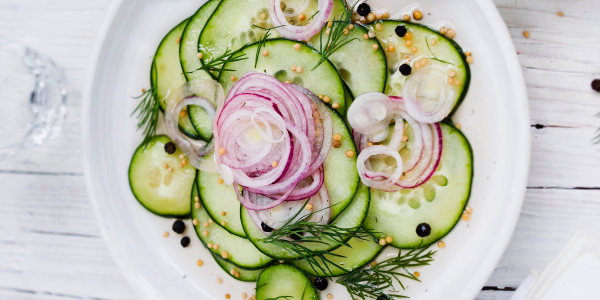When you think cucumbers, pickles or a low-calorie vehicle for dipping likely come to mind. While these can be tasty uses, they can be used for so much more. Cucumbers are the perfect salad topper, an integral part of tzatziki and the slight crunch in your favorite sushi.
What’s more, cucumbers provide a variety of important nutrients, like water, antioxidants, vitamins and minerals. Research even suggests eating cucumbers may protect against cancer and can help with blood-sugar control.
Learn more about the nutrition facts of cucumbers, plus the health benefits, interesting characteristics and tasty recipes to incorporate in your diet.
Cucumber nutrition facts
One cup of raw sliced cucumbers has:
- 16 calories
- 0.6 grams protein
- 4 grams carbohydrates
- 0.6 grams fiber
- 0 grams total fat
Cucumber benefits
Cucumbers consist of 95% water, making them a hydrating fruit (yes, they are a fruit because the seeds are on the inside).
About 60% of the human body is made up water, and you lose fluids on a daily basis through sweat, urine, feces and respiration. Replacing water throughout the day is important for hydration, maintaining optimal fluid balance within the cells and proper organ function. In addition, water is necessary for proper brain function and digestive processes, such as preventing constipation.
According to the Academy of Nutrition and Dietetics, about 20% of your daily water should come from food, such as cucumbers. So, the high water content of cucumbers is a big win for the body.
Cucumbers also contain a chemical compound, called cucurbitacin, which has been researched and shown to have some health benefits. Cucurbitacin has been studied for its ability to potentially hinder the growth of cancer cells. But since cucurbitacin is a chemical compound, it is extracted from cucumber and the research is performed in animals or test tubes. In other words, the results may not exactly translate to eating cucumbers, but there is potential to use the compound in cancer treatment. Yet, cucumbers and their seeds do have antioxidant properties, which help remove harmful free radicals from the body.
Lastly, animal studies have examined the effects of consuming cucumber on blood sugar and blood lipid levels. One study found that injection of cucumber extract into diabetic mice lowered blood sugar and cholesterol levels by 67% and 29%, respectively. Again, human studies are needed before sweeping recommendations about eating cucumber can be made. But, cucumber is a low-calorie fruit with fiber, vitamins, minerals and antioxidants, so including it in your diet is always a good idea.
More nutritional information on everyday foods
Cucumber side effects
Cucumbers are a perfectly healthy part of any eating pattern, but some people may find that eating them results in excessive burping. This is due to the compound curcurbitacin, which has been known to cause burping in some people. It’s also responsible for giving cucumbers their bitter flavor. Luckily, English or seedless cucumbers have less curcurbitacin and won’t result in the same response.
Fun facts about cucumber
Here are some interesting things you may not know about cucumbers.
It’s a great ingredient to juice
Due to their mild flavor and high water content, cucumbers are a natural fit for people who like to drink their fruits and veggies in juice form. But is juicing a cucumber actually good for you? In general, juicing a fruit of vegetable reduces the fiber content, which is one of the most worthwhile parts of the plant.
However, to get a full glass of cucumber juice requires multiple cucumbers, or more than most people eat in one sitting. That means cucumber juice may provide more vitamins and minerals than slicing up a ½ cucumber and throwing it into a salad. The best way to eat cucumber is the one that you will reliably and consistently do. If you prefer to juice the fruit, go right ahead.
Cucumbers are good for your skin
Due to their high water content and antioxidant properties, cucumbers are thought to have a natural cooling and soothing effect on skin. That’s why they are often used in facial products. As a matter of fact, cucumber slices are often placed on top of the eyes to reduce puffiness.
Varieties of cucumbers
There are hundreds of varieties of cucumbers, although you may only see a select few in supermarkets. Kirby cucumbers are the most common and are frequently transformed into pickles. English cucumbers are thinner, seedless and have a more mild flavor. Gherkin cucumbers are the tiny variety that are usually turned into gherkin pickles. There is even a white variety of cucumber, but it’s difficult to find in the supermarket.
Easy cucumber recipes
There are several ways to include cucumbers in the diet, from salads to slaws to tacos. Use these recipes to eat more of the hydrating fruit.

Getty Images

Ronnie Woo

Nathan Congleton / TODAY

Bravo

Nathan Congleton / TODAY

Nathan Congleton / TODAY
